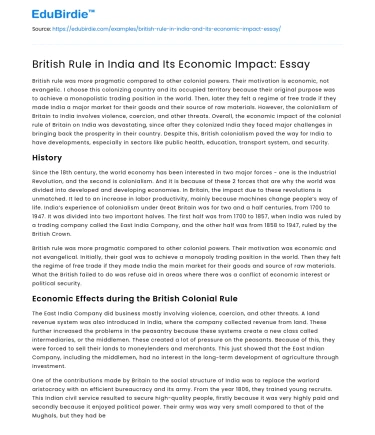British rule was more pragmatic compared to other colonial powers. Their motivation is economic, not evangelic. I choose this colonizing country and its occupied territory because their original purpose was to achieve a monopolistic trading position in the world. Then, later they felt a regime of free trade if they made India a major market for their goods and their source of raw materials. However, the colonialism of Britain to India involves violence, coercion, and other threats. Overall, the economic impact of the colonial rule of Britain on India was devastating, since after they colonized India they faced major challenges in bringing back the prosperity in their country. Despite this, British colonialism paved the way for India to have developments, especially in sectors like public health, education, transport system, and security.
History
Since the 18th century, the world economy has been interested in two major forces - one is the Industrial Revolution, and the second is colonialism. And it is because of these 2 forces that are why the world was divided into developed and developing economies. In Britain, the impact due to these revolutions is unmatched. It led to an increase in labor productivity, mainly because machines change people’s way of life. India’s experience of colonialism under Great Britain was for two and a half centuries, from 1700 to 1947. It was divided into two important halves. The first half was from 1700 to 1857, when India was ruled by a trading company called the East India Company, and the other half was from 1858 to 1947, ruled by the British Crown.
Save your time!
We can take care of your essay
- Proper editing and formatting
- Free revision, title page, and bibliography
- Flexible prices and money-back guarantee
British rule was more pragmatic compared to other colonial powers. Their motivation was economic and not evangelical. Initially, their goal was to achieve a monopoly trading position in the world. Then they felt the regime of free trade if they made India the main market for their goods and source of raw materials. What the British failed to do was refuse aid in areas where there was a conflict of economic interest or political security.
Economic Effects during the British Colonial Rule
The East India Company did business mostly involving violence, coercion, and other threats. A land revenue system was also introduced in India, where the company collected revenue from land. These further increased the problems in the peasantry because these systems create a new class called intermediaries, or the middlemen. These created a lot of pressure on the peasants. Because of this, they were forced to sell their lands to moneylenders and merchants. This just showed that the East Indian Company, including the middlemen, had no interest in the long-term development of agriculture through investment.
One of the contributions made by Britain to the social structure of India was to replace the warlord aristocracy with an efficient bureaucracy and its army. From the year 1806, they trained young recruits. This Indian civil service resulted to secure high-quality people, firstly because it was very highly paid and secondly because it enjoyed political power. Their army was way very small compared to that of the Mughals, but they had better training and equipment, and the railway network paved the way to greater mobility, better logistics, and enhanced intelligence.
The improvement in the transport facilities contributed to permitting some degree of specialization to cash crops. Plantations were developed especially for crops like indigo, sugar, jute, and tea. Despite the improvement in seeds, there were no extension services provided, no development in fertilizers, and no improvement to livestock. It is India that started the modern textile industry in Asia. Their modern jute manufacturing started at the same time as cotton textiles. Another industry that achieved significance is coal mining, which by 1914 had reached 15.7 million tons and had met the demands for Indian railways.
After the famine, the British contributed to public health by introducing vaccines such as the smallpox vaccine, introducing Western medicines and training to doctors, ways of killing rats and pests, and other quarantine procedures.
The problem during the time of the East India Company was resolved only after the transition from the East India Company to the British Crown. It became quite evident that British industry required India to be a major source of raw materials and a short market for British manufacturers. We can say that the British have now fallen to invest in burning in India. And this is through the irrigation, transport network, and port development sectors. They also felt the requirement of manpower. Therefore, English education was introduced.
Conclusion
Overall, the economic impact of British colonial rule on India was devastating. Much of their industry was destroyed during British colonialism. They took prosperity for any welfare of the Indians. And because its Indian economy faced stagnation and decline, which later became the main challenge to the development of independent India. Despite this, British colonialism paved the way for India to develop especially in sectors such as health, education, transport system, and security.
References
- Griffiths, P. (2019). Developments in Southern India. The British Impact on India, pp.78-85. doi:10.4324/9780429057656-8.
- Griffiths, P. (2019). The East India Company. The British Impact on India, pp.48-59. doi:10.4324/9780429057656-5.
- Szczepanski, K. (n.d.). How British Rule of India Came About - and How It Ended. Retrieved October 12, 2020, from https://www.thoughtco.com/the-british-raj-in-india-195275
- The Impact of Colonialism on African Economic Development. (n.d.). Retrieved October 12, 2020, from http://trace.tennessee.edu/cgi/viewcontent.cgi?article=1182&context=utk_chanhonoproj
- Washbrook, D. (2012). The Indian Economy and the British Empire. India and the British Empire, pp.44-74. doi:10.1093/acprof:oso/9780199259885.003.0003.






 Stuck on your essay?
Stuck on your essay?

